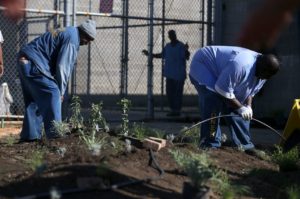
Over the past decade, Archie has struggled yet succeeded in forging a different path. Now a legal clinic coordinator with A New Way of Life, a Los Angeles nonprofit reentry program serving formerly incarcerated women, Archie conducts numerous civic engagement functions including voter education and community awareness around criminal justice issues. However, she clarified how her 2004 marijuana conviction worked against her discovering her own new way of life. Although initially able to find a job post-conviction, she was less fortunate once she lost that position. “I was laid off in 2009 and was unable to get another job until 2015,” said Archie, stressing the impact of the marijuana charge on her record and how it led to additional legal and financial problems. “I lost my apartment and, basically, my whole livelihood diminished because of that.”
Many are aware that Archie’s home state of California recently rang in the New Year with the implementation of its statewide legalization of recreational marijuana use allowing adults of at least 21 to purchase marijuana from a licensed dispensary. Yet most are less aware of a provision of Proposition 64, the November 2016 state ballot initiative that legalized recreational marijuana, enabling individuals like Archie with pot-related convictions to apply to get them reduced or dismissed. Unlike the New Year’s enactment of recreational use, this resentencing provision — a marijuana-specific version of its more general predecessor, Prop 47 — has been in effect for the past year. Under it, those who apply can have marijuana-related charges on their records reduced or dismissed, and those incarcerated can be released from prison. This is particularly encouraging for African-Americans, given the ACLU reported they are almost four times more likely to be arrested for possession of marijuana than white people, despite similar rates of drug use.
In the law’s first year, over 2,660 applications were filed to reduce sentences for people convicted of marijuana-related offenses and an additional 1,500 were submitted to reclassify old felony marijuana convictions as misdemeanors or expunge them altogether. California’s Judicial Council, which records such application data, doesn’t document the outcomes of these requests.
Still, for Archie, the impact is clear. “On the night that Prop 64 passed, I was the first person in the state of California to have my felony conviction go from a felony to a misdemeanor,” she revealed, recalling the proposition’s passage “on the same night Trump got elected.” Archie described how her clinic currently services an average of 60 people each month, mostly African-American and Latina, who come to their doors looking to get their convictions cleared. “A lot of people with crimes expunged from their records have been able to get jobs, to get housing, and live functional lives they were unable to before,” she reported.
Along with housing and other reentry services, explained Archie, A New Way of Life offers an expungement clinic twice a month in Long Beach and in Watts for people in the community who have records and “are trying to get jobs.” Flyers are distributed to community organizations and locations where “people with felonies would frequent and, once they call in, we ask them qualifying questions, see which clinic is more convenient for them, and let them know everything is free of charge,” said Archie. These clients then sit down with a clinic lawyer and file a petition for expungement with the court, which takes about six to eight weeks to respond. Once that takes place, continued Archie, “the lawyer will call you and let you know your record has been expunged and that you don’t have to take any further action, or we have to go back to court to do a little more fighting to get this off of your record.”
While 29 states have legalized medical marijuana, eight states, including California, in addition to Washington, D.C., Puerto Rico and Guam, have acted to legalize recreational marijuana. A few of those eight, including Oregon, which preceded California in legislating recreational use, also allow for the reduction or expungement of possession convictions under certain conditions. Despite this state-level progress, Attorney General Jeff Sessions has long voiced his opposition to cannabis and has drafted inflexible sentencing guidelines urging federal prosecutors nationally to pursue harsh sentences for drug offenses, no matter how minor. “Previous nationwide guidance specific to marijuana enforcement is unnecessary and is rescinded, effective immediately,” a January 4 Justice Department memo read. In it, Sessions rolls back an Obama-era policy that deprioritized prosecution of marijuana-related cases and gave states room for recreational use.
Sessions’ new heavy-handed direction could bring federal law enforcement into conflict with state authorities over marijuana policy, since the feds and the states appear to be moving in opposite directions. Some have already warned Sessions they are up for the fight. “We’ll give Jeff Sessions our legal pot when he pries it from our warm, extremely interesting to look at hands,” tweeted Democrats in Colorado’s State Senate in response to the Jan. 4 memo. However, such a fight is by no means an easy win for the feds.
“The truth is, states never needed the permission of the federal government to legalize marijuana under state law,” said Tamar Todd, a senior director of legal affairs at Drug Policy Alliance, which advocates for a regulation of drugs “grounded in science, compassion, health and human rights.” Todd explained that under the Tenth Amendment, states “have the authority constitutionally to set their own state laws and the federal government can’t force the states to criminalize anything under state law, and also can’t force the states to enforce their law.” So, continued Todd, “the federal government has to go at it alone, and the reality is that over 90 percent of all drug law enforcement happens at the state and local level.”
At that state level, Todd believes that California represents the “new gold standard of legalization” in criminal sentencing reform, and that such reform should accompany any legalization processes given the life-altering consequences and hefty price many of those convicted continue to pay.
“We no longer can just look at ending prohibition and adopting a better approach, but we now actually have to look back at undoing the harm that prohibition caused,” said Todd, noting that the “racial discrimination carried out in the enforcement of marijuana laws” carries with it the weight and “collateral consequences of those convictions, and continues to, throughout the course of people’s lives.”
Given California has invested much time, money and thought into its current remedial process and the lives it impacts, Archie ultimately feels the federal thwarting of the decriminalization of a natural substance that most feel should be medicinally and casually accessible truly represents a backward approach.
“If a person already has that felony conviction on their record, that person is more likely to recidivate back in to the same situation that they came from,” stressed Archie, pointing out how hard it is “for a person to get anywhere after they are released from incarceration. In order to counteract that, we need programs where people can get certain felonies wiped off of their records so that they can move forward, back into society, provide for their families, and not have to go back to jail.”


